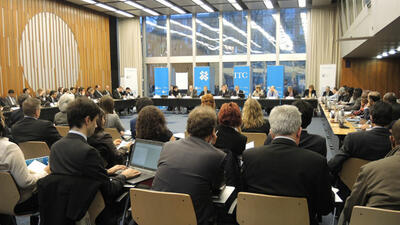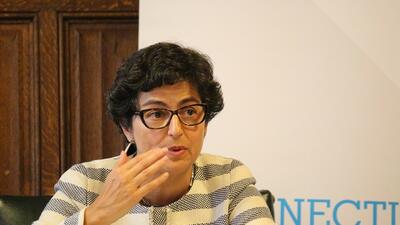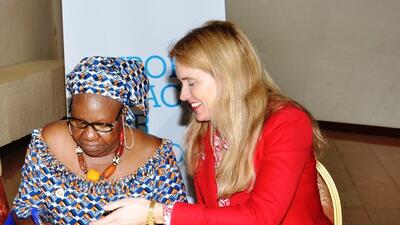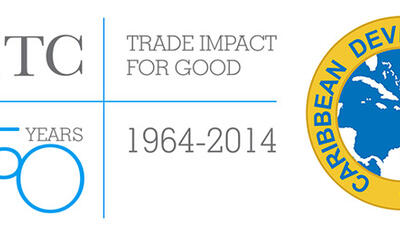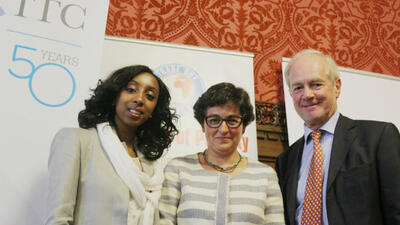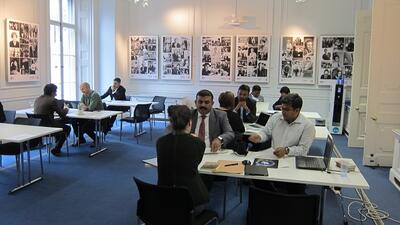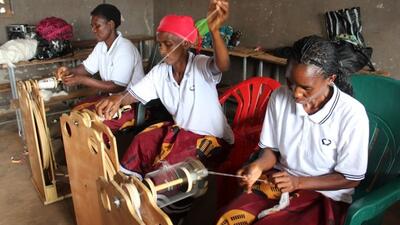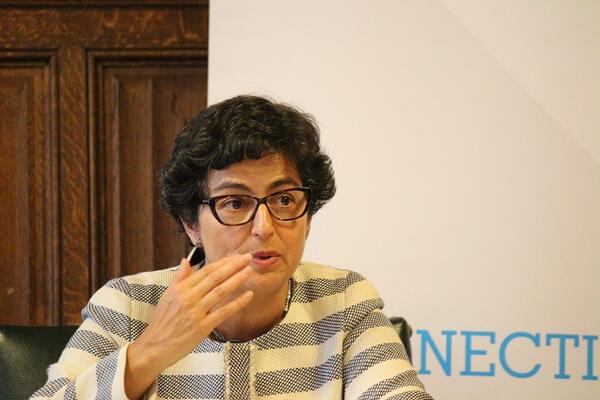
Statement by the Executive Director at the House of Commons
Statement by the Executive Director at the House of Commons
10 September 2014,London, United Kingdom.
(CHECK AGAINST DELIVERY)
Rt. Honourable Peter Lilley,
Ladies and Gentlemen,
It is a great honour for me to speak here today at the House of Commons on behalf of the International Trade Centre. I want to thank the Saana Institute and the All-Party Parliamentary Group on Trade out of Poverty, for the opportunity to talk about the importance of trade to development.
The ITC is a joint agency of the United Nations and World Trade Organization, and we are celebrating 50 years of assisting small and medium sized enterprises to internationalize and trade across national borders. It is a fitting time for reflection and to share with you some of the lessons we have learnt as to why unlocking the economic potential of SMEs, particularly women-owned SMEs is not only important, but an urgent prerequisite to achieving human and economic development. These lessons are especially pertinent today, as we accelerate progress in achieving the Millennium Development Goals and design the next development framework: the Post 2015 Development Agenda.
One key lesson, supported also by studies of the global economic crises is the need to diversify exports, not only in terms of diversifying the base goods and services exported, but in terms of diversifying destination markets, consumers and suppliers. This requires policy and strategy makers to better understand the unrealised potential in their economies. Armed with a knowledge of the economic activity of entrepreneurs in their economy, policy makers can negotiate in the interests of advancing export success of businesses in ‘new’ areas; and strategy makers can craft development plans attuned to addressing challenges in the business environment that impede success.
For many years the litmus test of development has been rising gross domestic product (GDP) for which the contribution of export earnings constitutes a significant and growing component. However, as the work of Thomas Pikkerty has brought into sharp focus – in a world of rising inequalities it is critical we determine success not only in terms of aggregate earnings, but also in how the benefits of growth are distributed.
Another important lesson relates to the importance of SMEs and, in particular, women-owners SMEs and their role in being the next generation of product and service suppliers as well as the next generation of job creators and providers. It is this lesson that I would like to spend some time discussing with you tonight.
To assist illustrate the point about the value of women-owned SMEs, we will later hear from Ms. Mahlet Afework (‘Mafi’), an award-winning fashion designer who runs a successful business in Ethiopia. Mafi is also a beneficiary of the UK-supported “ITC Women and Trade Programme”.
Ladies and Gentlemen – In order to get the most of the economy, policy makers and businesses need to fully understand the economic opportunities and associated benefits at hand. This is not always the case in both developed and developing countries.
Key players trading in and with developing countries may generally accept that women’s engagement and success in entrepreneurship can bring benefits to their families and communities, but they may not know what it is that women entrepreneurs can supply or export. The reality is that the potential for women business owners is huge: in developing countries women-owned companies represent close to 40% of all SMEs. Yet, key players in the economy know surprisingly little about the economic activity and potential of women entrepreneurs in their country.
Looking ahead, if we are to eradicate poverty and tackle inequality, we are going to have to come to a better understanding of the groups we need to serve and who can serve us. The talents of women entrepreneurs are yet to be unlocked – it is often quoted that women are the most underutilized resource in economies. However, through targeted and inclusive economic actions and policies on SMEs and in particular women-owned SMEs, we can turn this around.
Why is a focus on SMEs important, and in particular, on women-owned enterprises? Let’s consider some facts:
Fact 1: There is a global job crisis: close to 500 million jobs are needed globally for new entrants to the labour market over the next 15 years. Global unemployment increased from 170 million in 2007 to nearly 202 million in 2012, of which a large number - about 75 million - are young women and men.
Fact 2: SMEs provide two-thirds of all formal jobs in developing countries in Africa, Asia and Latin America and the Caribbean, and 80 per cent in low income countries, mainly in Sub-Saharan Africa.
Fact 3: Research shows that women invest up to 90% of earnings in their family and community – for example, in the health and education of children - compared to approximately 40% by men.
By considering these three facts together it becomes apparent that:
- We need to create more jobs
- SMEs are the backbone of most economies, generating jobs
- Money in the hands of women yields a development dividend.
- For governments pursuing a ‘growth’ agenda, SME and women-owned SME success is critical.
ITC has developed methodologies that assist policy and strategy makers, governments and institutions in developing countries to understand not only products but also the people - those active in the production of goods and services bound for the export market. In this way a more comprehensive picture can be built that helps understand export earnings not only in terms of monetary value derived at the national level – ‘aggregate export earnings’ – but to identify the men and women in supply chains, their different roles and responsibilities that are so often determined by sex and not capacity.
The stereotype, for example, that CEOs are men and women are the workers. In Uganda, women own 38% of enterprises, challenging notions that women are not interested or not capable of running businesses.
At the same time, in terms of employment across value chains studies do bear out that it is frequently women who are active in the low-value added, poorly remunerated, end of the value chain. Much can therefore be gained, by improving our understanding of the actual versus the assumed, of taking a much closer look at the roles and responsibilities of women and men engaged in export not only as entrepreneurs but also as employees and unpaid labour.
ITC has a history of providing such services in the area of national export and sector strategy formulation and implementation. The roots of our project on Empowering Women in Coffee in Africa, are in the Uganda National Export Strategy Gender Dimension. The study looked exclusively at four sectors in which women contributed to the economy and where export potential was deemed to be high: tourism, commercial handicrafts, coffee and dairy. In addition to discreet sector analyses within and export strategy, cross-cutting issues impeding success are also identified, such as women’s access to training, information and finance.
Based on the findings in the gender-sensitive value-chain analysis in the coffee sector, ITC crafted a project to address some of the issues identified in Uganda. But we went further than that. Issues such as lack of access to information, finance linkages to buyers, the absence of associations were found to be similar in other countries in the region, so our project tackled those four issues, in Burundi, Kenya, Rwanda, Tanzania and Uganda. The key finding in the study - that echoed in these countries - was that women do not get paid for their work. They are responsible for an estimated 70% of pre harvest activities, yet receive no remuneration for this.
While national and sectorial strategies identifying supply-side constraints is important, it is equally if not more important to link to market. Once buyers have been identified this determines many of the elements that need to be included in a programme of technical assistance. This varies from market to market and buyer to buyer. The standards in the UK differ from those in North America. Sainsbury’s has different criteria to be a supplier than Walmart. As our role is to help SMEs in developing countries achieve export success, the pre-identification of a target markets is important. Under ITC’s “Women and Trade Programme” a dedicated Platform has been established to facilitate connections between buyers interested in sourcing from women entrepreneurs in developing countries.
Since 2010 the Global Platform for Action on Sourcing from Women Vendors has yielded over USD25 million dollars in contracts and letters of intent to transact business have been signed by women entrepreneurs. We bring together over 800 buyers and over 50,000 women entrepreneurs through our partnerships plus 100 national trade support institutions. The aim of the Global Platform for Action on Sourcing from Women Entrepreneurs is to increase the share of corporate, government and institutional procurement by women-owned enterprises.
Again, another opportunity for governments. USD15 trillion dollars each year passes from the hands of governments to suppliers through the global government procurement market. And yet, only 1% of this market is today supplied by women owned enterprises. There is here an untapped potential which must be fully exploited. This is why the ITC will be launching an initiative to link women SMEs to public procurement markets during our flagship event – the World Export Development Forum - in Rwanda next week. We are keen to work with governments interested in exploring opportunities to better integrate women-owned companies into their supply chain.
Government procurement affords governments the avenue to ‘be the change they want to see’. That is, to structure procurement to enable entry points from SMEs, in particular those owned by women. We have an increasing number of governments working with us on this initiative from Samoa in the Pacific to Uganda in Africa. We would be delighted to work with actors for this change in the United Kingdom.
In a few moments, I would like to share a video with you in which you will hear companies like IBM explain why sourcing from women is important to their business.
This then brings us to our work on supply-side capacity building. Mafi will be sharing with you aspects of her journey. It is entrepreneurs like Mafi that we look for, who can generate jobs for compatriots, when they expand successfully into new markets. Mafi is one of a group of women entrepreneurs that we are training, in partnership with the London School of Fashion and Parsons the New School in New York, on design and production techniques to improve marketability of their garments. The group consists of women entrepreneurs who are members of organisations that participate in our Global Platform for Action: The Centre for African Women’s Entrepreneurship in Ethiopia, Business and Professional Women in Mongolia and the Business Women’s Centre in Palestine. I am delighted Mafi is with us today.
The human dimension is an important aspect of trade and related capacity building for export success. Behind each tick in aggregate export earnings, either increasing or decreasing, is an impacted industry. Governments can better manage the flow of services – particularly to SMEs – to improve their competitiveness through access to market information, financial services and the like, armed with a strong knowledge of entrepreneurship in their economy. ITC is delighted with the strong partnership we have with the Government of the United Kingdom of Great Britain and Northern Island, through UKAID.
Once again, I am delighted to be here today, with Trade Out of Poverty and Saana Institute as they understand the centrality of inclusive entrepreneurship to sustainable economic development. Within that women’s economic empowerment is essential to achieve the social development that is also required for longer-term gains, for peace and security.
Thank you






